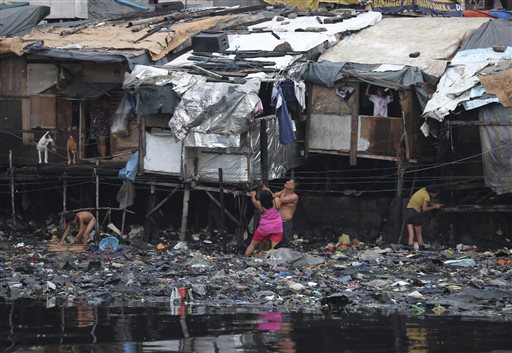Manila Bay gets makeover on int’l cleanup day

Informal settlers along the coast of Manila Bay. AP PHOTO/AARON FAVILA
Thousands of volunteers gathered on Saturday along Manila Bay to pick up the trash on the shore as part of the annual International Coastal Cleanup (ICC) Day.
Philippine Coast Guard spokesperson Commander Armand Balilo said the volunteers collected thousands of plastic bags of garbage.
By press time, the cleanup had yielded 21 truckloads or 100 tons of garbage, which included glass and plastic bottles, food wrappers, cigarette butts, soda cans and eating utensils, grocery bags, straws and stirrers, plastic bottle caps, plastic lids, take out containers, beverage bottles and plastic cups.
Balilo said the garbage came from informal settlers, particularly those living in Parola, Tondo.
Major contributor
Article continues after this advertisement“They were the major contributor of the trash,” he said.
Article continues after this advertisementBalilo said the volunteers were composed of students, government and nongovernment organization workers and members of the Philippine Coast Guard Auxiliary, Armed Forces of the Philippines and Philippine National Police.
The cleanup had 8,351 registered volunteers and 700 Manila City Hall employees and garbage haulers, who were later joined by 1,000 others from 20 private groups, according to Manila City Hall public information officer Bambi Purisima.
Last year, there were 107,695 volunteers countrywide who picked up 208,438 kilos of garbage.
“Whatever our backgrounds are, we are united for one purpose: To clean up this bay and its environs, and to restore it to their pristine glory,” Manila Mayor Joseph Estrada said, citing the “worsening” condition of Manila Bay, in his speech before the start of the cleanup.
Estrada said the elders had good memories of Manila Bay as “a clean bay that teemed with marine life and was remarkably blue—a source of visual pleasure. Now, Manila Bay signifies pollution, irresponsible management, lack of discipline and political will,” he said.
Mother Nature strikes back
Estrada urged the people to act quickly and help in cleaning up Manila’s coastal areas as “Mother Nature is striking back.”
“Millions of consumers now have to contend with daily nine-hour water interruptions in Manila because Angat Dam’s water level remains critical,” Estrada said, attributing the development to the onset of El Niño.
In 2009, a similar phenomenon occured, forcing water concessionaires to ration the daily water supply to its millions of customers, he said.
The ICC, Coast Cleanup Philippines’ largest volunteer effort for the oceans, is held every third Saturday of September and participated in by the cities of Manila, Pasay and Navotas and 20 provinces.
People worldwide gather on beaches, coasts, rivers and waterways to remove trash and record information that will result in better waste management policies, plans, product packaging designs, and in stirring consciousness among the people, the group said in its website.
ICC was started in 1986 in Texas through the initiative of Ocean Conservancy, a nongovernment organization for the protection of the oceans.